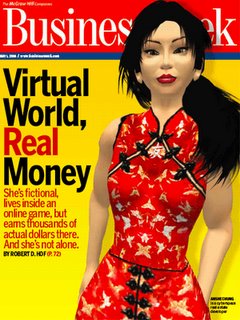the red pill
 BusinessWeek's May 1 issue has an in-depth cover story on the growth of massively multi-player online games, which we wrote about a little over 2 months ago, based on this Wired article.
BusinessWeek's May 1 issue has an in-depth cover story on the growth of massively multi-player online games, which we wrote about a little over 2 months ago, based on this Wired article.The BW article spends a lot of time talking about the avatar pictured to the left who is also mentioned in Wired, Anshe Chung, and how she has become the "Rockefeller of Second Life." Another success story of the virtual world is the computer programmer who created a puzzle-style game that caught on in Second Life, and now he has a deal in the works with a licensing company to bring his game to Nintendo and mobile phones.
Online BW has some great additions that didn't fit into the article. In this interview with the popular real estate queen, she's asked what makes her so successful in Second Life. Her answer shows her success is driven from her credibility and passion, but it also acts as a warning for any brands that may be thinking about entering these virtual worlds on a whim:
"One reason for my success here, I strongly believe, is that I am not only here for business. I am very deeply rooted in this world, like a real native person. Most people who just come here for money fail miserably. They are foreigners, act like foreigners, and lack deep understanding of this virtual country. Many of them are also lazybones who think you just need money to make more money. The truly successful people I know here all are deeply involved in life and society here too."
This interview with Edward Castranova, a telecommunications professor specializing in online gaming, offers more insight into the growth of games, and more warnings for over-commercialization:
"I'm also concerned that this commercial impulse could swallow up the separateness of these places. I would hate to see all that lost because of unregulated profit-seeking."
Down in the comments section there's a small discussion going, and one reader wrote in with this note regarding the merits of Second Life and other games:
"...I'll defend virtual life. I'm disabled, and unable to partake of many activities healthy people take for granted. Virtual life helps relieve the boredom, the frustration, of getting left behind. It's a way to stimulate my creativity, as well as to indulge myself in social interaction. Being a senior intensifies the experience, because in a society where older folk are cast off and trivialized after their health status fractures, this could become a valuable tool in restoring morale. I love my virtual life. Yes, I have a real life too, but have learned to balance with one foot in both dimensions."
As these games grow in popularity, we'll see some bumps along the way - what would the grey hairs on Capitol Hill would do if these games get hugely popular and the virtual stock exchange or currency systems stay unregulated yet successful for several years? What happens when the amount of real money changing hands rivals that of large corporations?
 All this makes me think we're on the way to a virtual office society, where we just hang out at home in the pjs and log in to work via our avatars. The virtual/real world line will probably fall a little differently for every person, but we all will end up involved in a virtual life in some way or another. Hello, Web 3.0.
All this makes me think we're on the way to a virtual office society, where we just hang out at home in the pjs and log in to work via our avatars. The virtual/real world line will probably fall a little differently for every person, but we all will end up involved in a virtual life in some way or another. Hello, Web 3.0.


1 Comments:
That's a great thought Xen -- are we just avatars of some other species? It makes my head ache to think about it too much.
Post a Comment
Subscribe to Post Comments [Atom]
<< Home